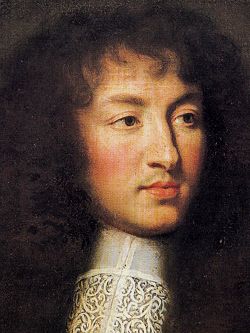


Cause of death: gangrene
184 cm
Louis XIV (Louis-Dieudonné; 5 September 1638 – 1 September 1715), also known as Louis the Great (Louis le Grand) or the Sun King (le Roi Soleil), was King of France from 1643 until his death in 1715. His verified reign of 72 years and 110 days is the longest of any sovereign. An emblematic character of the Age of Absolutism in Europe, Louis XIV's legacy is widely characterized by French colonial expansion, the conclusion of Eighty Years' War involving the Habsburgs, and his architectural bequest, marked by commissioned works of art and buildings. His pageantry, opulent lifestyle and ornate cultivated image earned him enduring admiration. Louis XIV raised France to be the exemplar nation-state of the early modern period, and established a cultural prestige which lasted through the subsequent centuries until today.
Louis began his personal rule of France in 1661, after the death of his chief minister Cardinal Mazarin, when the King famously declared that he would take over the job himself. An adherent of the divine right of kings, Louis continued his predecessors' work of creating a centralised state governed from the capital. He sought to eliminate the remnants of feudalism persisting in parts of France; by compelling many members of the nobility to reside at his lavish Palace of Versailles, he succeeded in pacifying the aristocracy, many of whom had participated in the Fronde rebellions during his minority. He thus became one of the most powerful French monarchs and consolidated a system of absolute monarchy in France that endured until the French Revolution. Louis also enforced uniformity of religion under the Catholic Church. His revocation of the Edict of Nantes abolished the rights of the Huguenot Protestant minority and subjected them to a wave of dragonnades, effectively forcing Huguenots to emigrate or convert, virtually destroying the French Protestant community.
During Louis's long reign, France emerged as the leading European power and regularly made war. A conflict with Spain marked his entire childhood, while during his personal rule, Louis fought three major continental conflicts, each against powerful foreign alliances: the Franco-Dutch War, the Nine Years' War, and the War of the Spanish Succession. In addition, France contested shorter wars such as the War of Devolution and the War of the Reunions. Warfare defined Louis's foreign policy, impelled by his personal ambition for glory and power: "a mix of commerce, revenge, and pique". His wars strained France's resources to the utmost, while in peacetime he concentrated on preparing for the next war. He taught his diplomats that their job was to create tactical and strategic advantages for the French military. Upon his death in 1715, Louis XIV left his great-grandson and successor, Louis XV, a powerful but war-weary kingdom, in major debt after the War of the Spanish Succession that had raged on since 1701.
Some of his other notable achievements include the construction of the Canal du Midi, the patronage of artists, and the founding of the French Academy of Sciences.
Source : Wikipedia